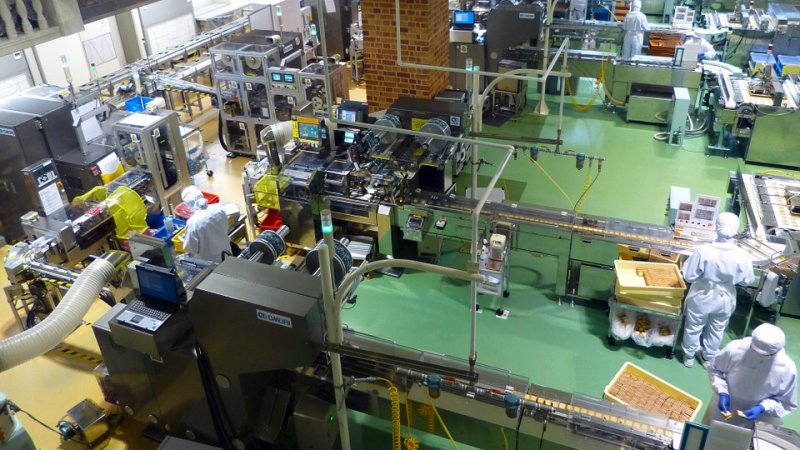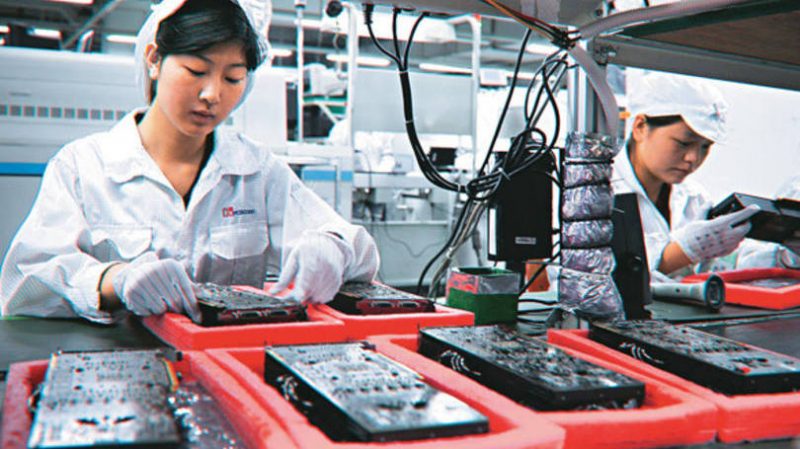Working in Japan but don't know what phrases to use? Didn't understand what a co-worker or boss said? In this article, we are going to share some Japanese phrases for you to use in your work, especially if you are in a factory.
Índice de Conteúdo
Tips for doing well in Japan's factories
Many Brazilians feel in their comfort zone due to the ease and lack of need to use the Japanese language in factory work. Still, it's important to learn at least the basics like hiragana and katakana, in addition to basic words like lengths.
A cultural aspect in Japan is that you have to do things the way you're told, without taking shortcuts or using things that might make the job easier. If you deviate from the orderly pattern, you are likely to get into some trouble.

Another thing you need to keep in mind is formality. In the Japanese language there are several ways to express the same thing. It all depends on the occasion or person you are talking to. It is best to use the most polite way possible to avoid problems in the workplace.
In factories and workplaces there is a hierarchy of roles or positions called yakushoku [役職]. The positions are Kaichoo, Shachoo, Senmu, Joumu, Buchoo, Jichoo, kachoo, Kakarichoo, Shunin and ect.
Blacklist – Basic behavior in the corporate world of Japan. Consisting of houkoku what does reporting mean rerraku what does it mean to inform and soudan which means to consult. There are 3 points that you should always give full importance to.

Below we will leave some quick trivia and also some useful links to articles related to work and factories.
- Factories in Japanese are called koujou [工場];
- Factory worker says koujou roudousha [工場労働者];
- Punctuality is mandatory in Japanese culture;
- If you hear "hayaku" [早く], then run, it means quickly.
- Complete article about overtime in Japan;
- Kaizen - Method to streamline productivity;
- The negative side of working in factories;
The 10 most important expressions at work
The 10 most important expressions, words or phrases you need to learn in Japanese in the workplace are:
Good morning – Learning Japanese greetings is a must. The Japanese are polite, as much as the atmosphere in the factory can be a little cold, always try to surprise and be a kind person, greeting each one of them.

Yoroshiku Onegaishimasu - Before any activity or task, or when asking someone for help or favor, always remember to say Yoroshiku Onegaishimasu.
Thank you very much – Giving thanks is a fundamental part of Japanese culture. The Japanese tend to thank you for almost everything, or even for no reason. Always remember to show gratitude for the help you get from your coworkers.
Ganbarimashou - It means let's strive together, good luck to all. Kind of an incentive, it can mean hard, try hard and stuff like that.

Osewa ni Narimasu – It can mean many things and has many uses, but it is a way of thanking you for your support, kindness, work and cooperation provided either in the past, ongoing or future. You can add the itsumo to thank you for always being helping.
Otsukare sama deshita! – Usually used after work to thank you for the work done. It's like a thank you for your hard work. Can be used with co-workers who are leaving or finishing a job. Gokurou-sama is another similar word, but is used by superiors and bosses to talk to subordinates.
Onegai Shimasu and Kudasai – There are 2 ways to ask please, it is always good to say these words in different situations. The article marked in the title of these words will tell you a little about the difference between them.

Gochui Kudasai – Means please be careful, a perfect expression in various situations during factory work.
Osaki ni Shitsurei Shimasu – In case you have to leave before your co-workers, it's good to always say this expression that literally means sorry for leaving before you.
Wakarimashita – In a factory you will hear this expression a lot. It states that you understood what was commanded or commanded. It literally means I got it.

Words and expressions related to work
- Jinji-ido [人事異動] - Personnel changes - change departments within a company;
- Naitei [内定] - Decisive information - Just before making an employment contract;
- Naiji [内示] - Unofficial notice - Private announcement about changes within a company;
- Teinen [定年] - Retirement age - usually 60;
- Sasen [左遷] - Relegation - demotion;
- Shookaku or Shooshin [昇格・昇進] - Promotion;
- Eiten [栄転] - Promotion to a higher rank;
- Shushinkoyoo [終身雇用] - Lifetime Employment;
- Shokui [職位] - Title - post or status within a company;
- Kamihannki [上半期] - The first half of the year - Kamiki;
- Shimohanki [下半期] - The second half of the year - Shimoki;
- Jooshi [上司] - Superior - Boss or someone higher up;
- Shitauke [下請け] - Subcontract - subcontract work;
- Jinkenhi [人件費] - Cost of work;
- Kikakusho [企画書] - project proposal;
- Nekuzure [値崩れ] - price collapse;
- Saimu [債務] - Debt;
- Shueki [収益] - Earnings;
- Torihikisaki [取引先] - Client - business connection;
- Juchuu [受注] - order acceptance;
- Shoohinkaitentitsu [商品回転率] - merchandise turnover rate;
- Eigyoonendo [営業年度] - Fiscal year (starts in April);
- Zaiko [在庫] - stock;
- Yakin [夜勤] - Night shift;
- Kogaisha [子会社] - Subsidiary company - Affiliated company;
- Shijoochoosa [市場調査] - Marketing research;
- Tetsuya [徹夜] - stay all night;
- Teate [手当] - allowance - subsidy like family allowance;
- Tooshi [投資] - Investment;
- Shisha [支社] - branch - branch;
- Nikkin [日勤] - Day shift;
- Hayade [早出] - precocity - to work early;
- Gekkyu or Kyuuyo [月給・給与] - Salary - Monthly payment;
- Yuukyu [有給| - Paid leave; Paid vacations;
- Kyuka [休暇] – Paid time off; Paid vacations; Leave of absence;
- Honsha [本社] – Corporate headquarters; Parent company; Leave of absence;
- Overtime [残業] - Overtime;
- Kessan [決算] - Closing accounts for the fiscal year;
- Hacchuu [発注] - Order;
- Keiretsugaisha [系列会社] - Subsidiary company - Smaller allied companies;
- Nouki [納期] - Delivery date - Delivery date;
- Mitsumori [見積り] - Estimate;
- Oyagaisha [親会社] - matrix;
- Shihon [資本] - The capital;
- Akaji [赤字] - Deficit - negative results;
- Taisyokukin [退職金] - retirement allowance - retirement money;
- Kuroji [黒字] - Surplus - positive value;

The article is still halfway through, but we recommend also reading:
Factory Work - Japanese Word List
Below we will share a list of words to improve your vocabulary in factories and other jobs in Japan. Hope you like it:
| Portuguese | Japanese | Romaji |
| (Age Limit) Retirement | (定年)退職 | (teinenn) taishoku |
| new employee | (新入)社員 | (shinnnyuu) shainn |
| (Paid) leave of absence | (有給)休暇 | (yuukyuu) kyuuka |
| salary increase | 昇給 | shoukyuu |
| stamp | 印鑑・判子 | innkann / hannko |
| business card | 名刺 | meishi |
| customers / customers | 顧客 | kokyaku |
| counselor | 相談役・顧問 | soudannyaku / komonn |
| counter | 経理 | keiri |
| dismissal | 解雇 | kaiko |
| employee | 従業員 | juugyouinn |
| hired employee | 契約社員 | keiyaku’shainn |
| customer entertainment | 接待 | settai |
| office | 営業所 | eigyousho |
| I estimated | 見積書 | mitsumorisho |
| executive | 重役・役員 | juuyaku / yakuinn |
| invoice | 請求書 | seikyuusho |
| branch | 支社 | shisha |
| employees | スタッフ | sutaffu |
| factory | 工場 | koujou |
| department manager | 部長 | buchou |
| section manager | 課長 | kachou |
| hourly pay | 時給 | jikyuu |
| part time job | アルバイト/パート | arubaito / Pa-to |
| company personnel | 会社員 | kaishainn |
| president | 会長 | kaichou |
| President | 社長 | shachou |
| promotion | 昇進 | shoushinn |
| receipt | 領収書 | ryoushuusho |
| work regulations | 就業規則 | shuugyou’kisoku |
| leaving early | 早退 | soutai |
| wage | 給料 | kyuuryou |
| secretary | 秘書 | hisho |
| late | 遅刻 | chikoku |
| overwork time | 残業 | zanngyou |
| Training | 研修 | kennshuu |
| sales | 営業 | eigyou |
| vice president | 副社長 | fuku’shachou |







